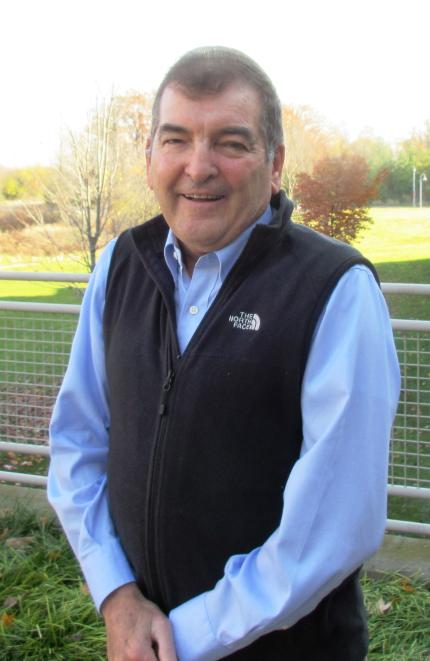Regional Pastors Meet for Fellowship, Worship and Continuing Education

Chris Meehan
Over 80 Regional Pastors and Specialized Transitional Ministers, including spouses, met on Nov. 3-5 for fellowship, worship and continuing education at the 2015 Regional Pastor Conference.
They came from all over North America to attend this biennial event that was held at the Prince Center on the campus of Calvin College in Grand Rapids, Mich.
“Regional pastors are active or retired pastors who provide pastoral support to active clergy and spouses in a classis,” says Denise Posie, a consultant for the CRC’s Pastor/Church Relations office.
“Regional pastors build relationships with pastors, commissioned pastors, and their spouses through regular contact and conversation, assist in arranging mentors for new pastors, and come alongside the pastor in times of discernment of a particular challenge or opportunity.”
This summer, the Pastor/Church Relations Office expanded the role of regional pastors by connecting them to assist Calvin Seminary students who were serving as interns at churches in various classes, said Posie.
The Regional Pastor Conference included a panel discussion with Dr. Steven Timmermans, executive director of the CRC, Colin Watson, director of ministries and administration and Rev. Darren Roorda, director of Canadian Ministries.
In their discussion, the three CRC leaders shared personal stories, joys and challenges they have faced as they have assumed their roles over the last two years.
They also encouraged and commended the work of regional pastors.
There was another panel discussion as well as a presentation by Rev. David Koll, director of Candidacy. In addition, there was a special recognition of regional pastors based on their approximate years of service, said Posie.
Rev. Ron Nydam, retired professor of pastoral care at Calvin Theological Seminary, gave three keynote addresses at the conference.
Nydam said his presentations focused on raising questions for regional pastors to consider.
He titled his first presentation “Hearing the Voice of the Holy Spirit in our own Hearts.” His second talk was “Hearing the Voice of the Holy Spirit in our Hearts in Community.” This presentation was followed by a discussion led by Norm Thomasma, director of the Pastor/Church Relations office.
And the third, in which Nydam began with reflections on his own fight with cancer, was called “Theological Reflection — Worship and Pastoral Care.”
In talking about cancer, Nydam spoke of lessons he’s learned.
Cancer, he said, has made him acutely aware of paying attention to the times of joy, such as when he recently had the opportunity to baptize his grandson in the Snake River in Wyoming.
But then there are the other, more difficult sides to having the disease.
“There are times when I have been in lament and have had conversations with God that aren’t very friendly,” said Nydam.
After speaking about lessons he has learned from having cancer, Nydam said to the regional pastors that they should keep in mind “the breadth of the human struggle” as they reach out to fellow pastors in their ministries.
From there, Nydam bridged into the topic of worship and suggested that the pastors “think through very carefully how theology plays out in all aspects of worship today.”
“We want to ask what is the nature of God and how do we express that in our worship,” he said.
Worship today is changing compared to several years ago when many people in churches viewed God as a judge and as being distant from his people, said Nydam.
How can regional pastors help pastors sort through this change? he asked.
Nydam went on to wonder: “How is Jesus presented in our services of worship today — is he seen as a savior, friend, reigning king, servant?”
In churches these days, people are seeking a God who is immanent and close, a God whose “face shines upon us,” said Nydam.
They want a God with whom they can struggle, he said, and yet also a God who gives his people his grace, which is “love that is God’s gift.”
Nydam also asked regional pastors to consider how the teaching of atonement — the doctrine that Christ died on the cross to atone for the sins of humankind — is no longer the central spiritual concern of our culture.
“We live in a culture that is no longer interested in atonement,” he said. “That’s because guilt, feeling remorse over our sins, is no longer a felt need in our culture. The central spiritual concern of today’s society is that of meaning. People need to know that they matter to God before they have any sense of disappointing him.”
This doesn’t mean that atonement, said Nydam, is no longer a central doctrine of the church. It only means that before getting to the need for forgiveness, regional pastors should attend to the need for care.
Before one can feel guilt and accept the need for atonement, “people have to realize that God loves them and that they matter,” said Nydam.
He finished by suggesting that the regional pastors, especially as they perform tasks of pastoral care, ask, “How do we acknowledge and experience the presence and work of the Holy Spirit in our worship today?”
“How is the Holy Spirit falling on us, dwelling with us, today? What can we learn from our Pentecostal friends and how they emphasize the wonderful power of the Holy Spirit?”
He also said: “Could it be the centrality of Christology in our way of doing theology has the unintended consequence of not noticing the experience of the Holy Spirit in our lives and in our worship?”
“The Regional Pastors were encouraged by Rev. Nydam’s strength, wisdom and vitality. Ron was especially appreciative of the pastoral care that this group of pastors gave to him,” said Posie.


